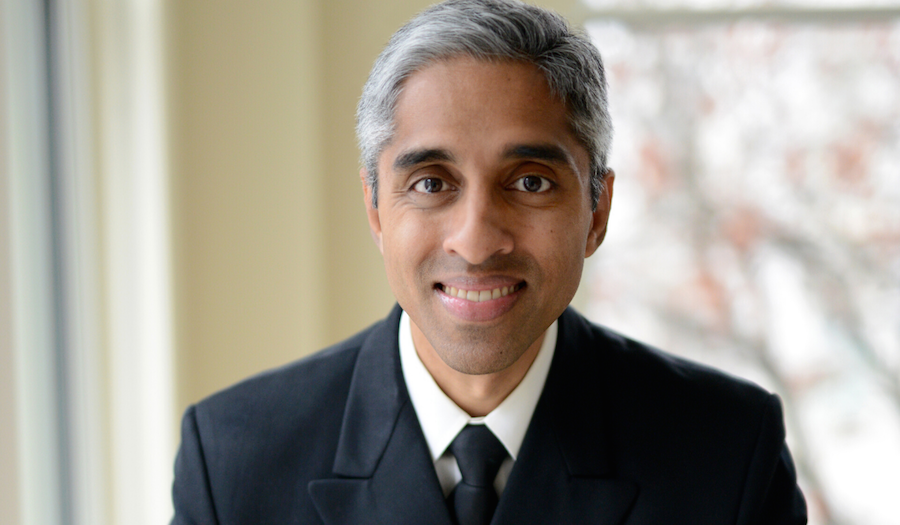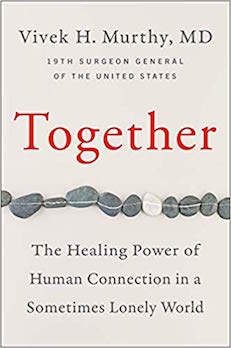How Increased Social Interaction Will Cure an Epidemic of Loneliness

Photo Credit: Meredith Nierman
In former Surgeon General Vivek Murthy’s groundbreaking new book, “Together: The Healing Power of Human Connection in a Sometimes Lonely World,” Murthy argues that loneliness is the underpinning to the current crisis in mental wellness.
Fortunately, all hope is not lost. Social connection, Murthy argues, can be an antidote for the growing public health crisis. In Together, he addresses the importance of community and connection, and offers viable and actionable solutions to this overlooked epidemic.
1. You were one of the first physicians to bring awareness to what you call an "epidemic of loneliness" in the U.S. How did you come to see loneliness as a public health crisis?
The most common condition I saw as a doctor was not diabetes or heart disease; it was loneliness. Early in my medical career, I noticed that many patients went days and even weeks with no visits, no phone calls, no one from the outside world asking how they were doing. Some of them even died alone with nobody but me and my hospital colleagues to witness their last moments. There was a hunger for companionship that was evident in many of the men and women I cared for over the years.
Later, when I visited communities across the country as Surgeon General, I found that the problem was far more widespread than I had realized. Behind many of the stories I hear of addiction, violence, depression, and chronic disease were threads of loneliness that fed into these conditions and made them worse. This was true for people across socioeconomic classes, geographies, and ages. More than 20% of US adults admit to struggling with loneliness, and young people have particularly high rates of loneliness. There is also a stigma around loneliness that makes people feel ashamed to admit they are lonely.
I came to a deeper appreciation for the science behind loneliness which tells us that loneliness and weak social connections are associated with a reduction in lifespan similar to that caused by smoking 15 cigarettes a day and even greater than that associated with obesity. Loneliness is also associated with a greater risk of cardiovascular disease, dementia, depression, and anxiety. At work, loneliness is associated with reduced engagement and productivity. In our schools, loneliness affects our children’s self-esteem and their development.
I often worry that we have lost sight of the fundamental need that each of us have for one another. This topic is personal to me because I was lonely for many years as a young child, but I felt too ashamed to admit it to my family or teachers. Science and our lived experience offer a simple but powerful lesson: we need each other. One of the greatest challenges facing us today is how to rebuild lives that put our relationships at the center. A people-centered world is one where we are healthier, happier, and more fulfilled.
2. Data has shown that loneliness can actually be deadlier than chain smoking. Why is social connection so important to our overall health and life expectancy?
Humans have evolved over time to be social beings. Thousands of years ago, our survival depended on our ability to work together for mutual aid and protection. The ability to cultivate trusted relationships became an evolutionary advantage. When we were separated from the group—when we were alone—our chances of survival dropped as we became more at risk for starvation and attack from predators. Loneliness in this context generated a physiological stress state that prepared us for fight or flight.
Loneliness is a normal, healthy signal that we need more social connection, just like hunger and thirst signal us to fill a biological need. But it becomes particularly problematic when loneliness lasts for a long time. In such circumstances, loneliness places our body in a chronic stress state. In such a state, we have greater levels of cortisol and hormones as catecholamines flowing through our bodies, which over time, can lead to elevated levels of inflammation. This, in turn, damages our tissues and increases our risk of cardiovascular disease and other chronic illnesses. Studies have also found that loneliness has been associated with poor quality sleep, impaired wound healing, and changes in gene expression in white blood cells leading to reduced defenses against viruses.
The bottom line is loneliness is harmful to our health. Conversely, social connection is vital to our health and well being and is one of the most powerful resources we have.
3. You've argued that the workplace is a good place to start tackling issues of loneliness. Why start there and not at home?
If we want to address loneliness, we must tackle it on multiple fronts. That means designing our workplaces to optimize connection, cultivating social and emotional learning in schools, and incorporating practices in our day to day life that improve the quality of our social connections at home and in our communities.
Work is where many of us spend a large portion of our waking hours, so it’s an important front for addressing loneliness. In addition to the benefits of connection to the individual, studies have found that higher-quality social connections at work lead to better job engagement, performance and safety. Few workplaces focus attention on fostering connection, though, and many even actively discourage employees from becoming friends. So workplaces are a relatively untapped arena for harnessing the power of social connection.
4. Many people point to technology as a reason for our increasing isolation. Do you agree? And if so, what can we each do to make sure we're making healthy and regular connections to other people despite our devices?
Technology is a tool. How we use it determines whether it strengthens or weakens connection. Being able to video conference and text with family and friends who are far away helps us stay connected to people we care about. Many people find communities online that help them feel a sense of belonging. And others use technology to facilitate in-person gatherings. That said, the way most of us use technology, particularly social media, has hurt our interactions with each other and weakened our relationships overall.
In some cases, technology has led us to be more distracted during conversations with friends and family. In other cases, it has added distance and removed context from our interactions and exchanges. And in still other circumstances, technology has led us to substitute lower quality interactions online for what used to be higher quality engagements in person. Our cities are filled with people who have thousands of friends on Facebook and contacts on Linkedin but who feel profoundly alone. But it doesn’t have to be this way. Carving out at least 15 minutes a day to see, talk to, or message someone we care about can make a big difference.
Creating a sacred space where technology doesn’t interrupt our interactions—such as family dinners or conversations with friends—can also be very helpful. And making kindness the bedrock value that guides our virtual interactions is essential to ensuring that our online experience is marked by positive social engagements with friends and strangers. As much as we can do in our own lives, it is also incumbent on technology companies and a new generation of humanistic entrepreneurs to imagine and design technology that intentionally strengthens our connections with each other instead of weakening them, that prioritizes quality in our interactions over quantity, and that supports a healthy and engaged society.
Dr. Murthy’s book, “Together: The Healing Power of Human Connection in a Sometimes Lonely World,” will be released on April 28, 2020. Click here to pre-order.

This Q&A was featured in the January 26th edition of The Sunday Paper. The Sunday Paper inspires hearts and minds to rise above the noise. To get The Sunday Paper delivered to your inbox each Sunday morning for free, click here to subscribe.


